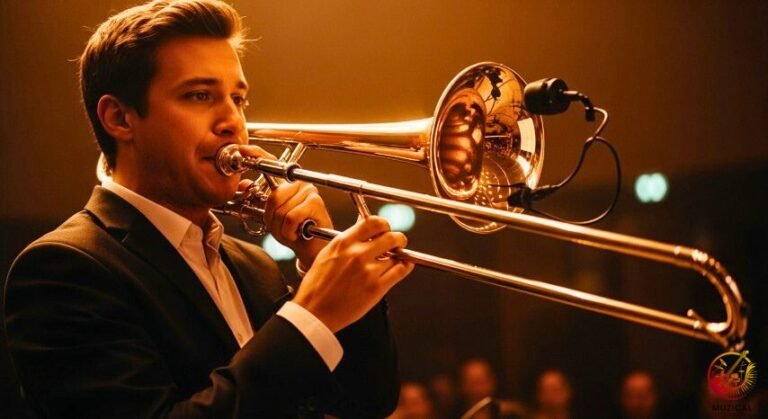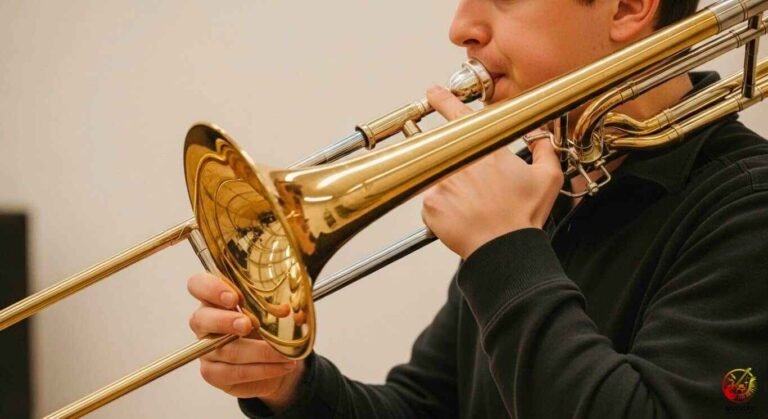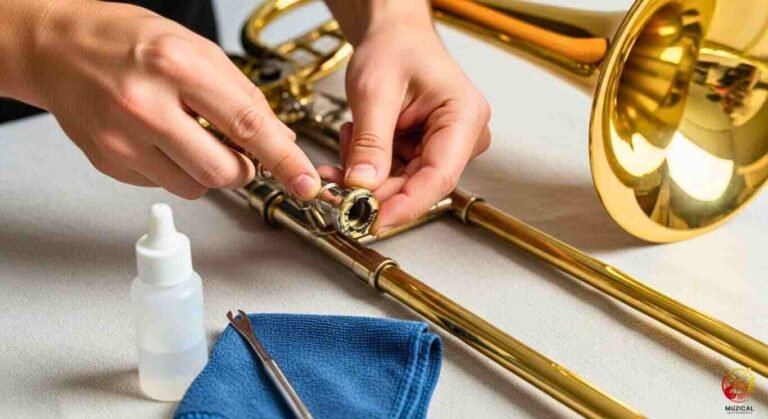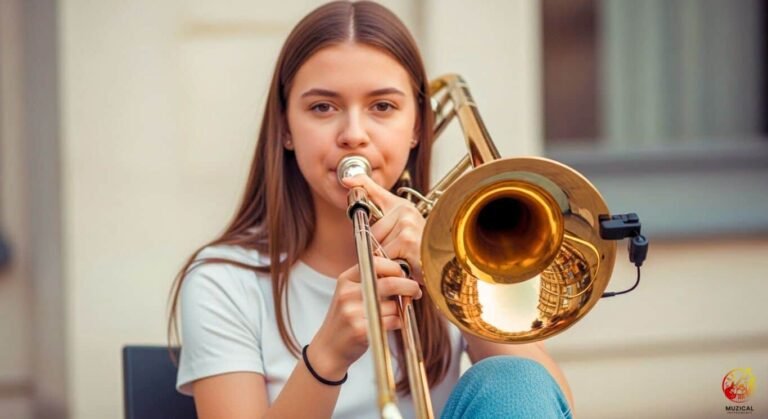Why Is the Trombone a Special Instrument?
Why is the trombone a special instrument? Because it’s the only one in the brass family that uses a slide. No buttons. No keys. Just a long slide with seven positions you move back and forth. This makes the trombone sound smooth and fun.
It can gliss between notes. That is a glissando. It will sound like a man laughing, crying, or even talking.
The trombone is part of a big family. It takes its seat next to trumpets, tubas, and the rest. But it has its own sound. And that is why it shines in jazz, in marching bands, and in big orchestras.
Beethoven even used it in his music. Trombone Shorty and Glenn Miller made it famous too.
There are different kinds, tenor, bass, and even plastic ones like the pBone for kids. So if you want an instrument that slides, sings, and always stands out, the trombone might be just right for you.
It Slides Like Nothing Else
One big reason why the trombone is a special instrument is the way it changes notes. Most instruments press buttons. The trombone doesn’t. It uses a slide. You move it in and out to change the sound. The slide has seven spots, called positions. Each one gives a different note. But you can also stop in between them. That’s something you can’t do on a trumpet.
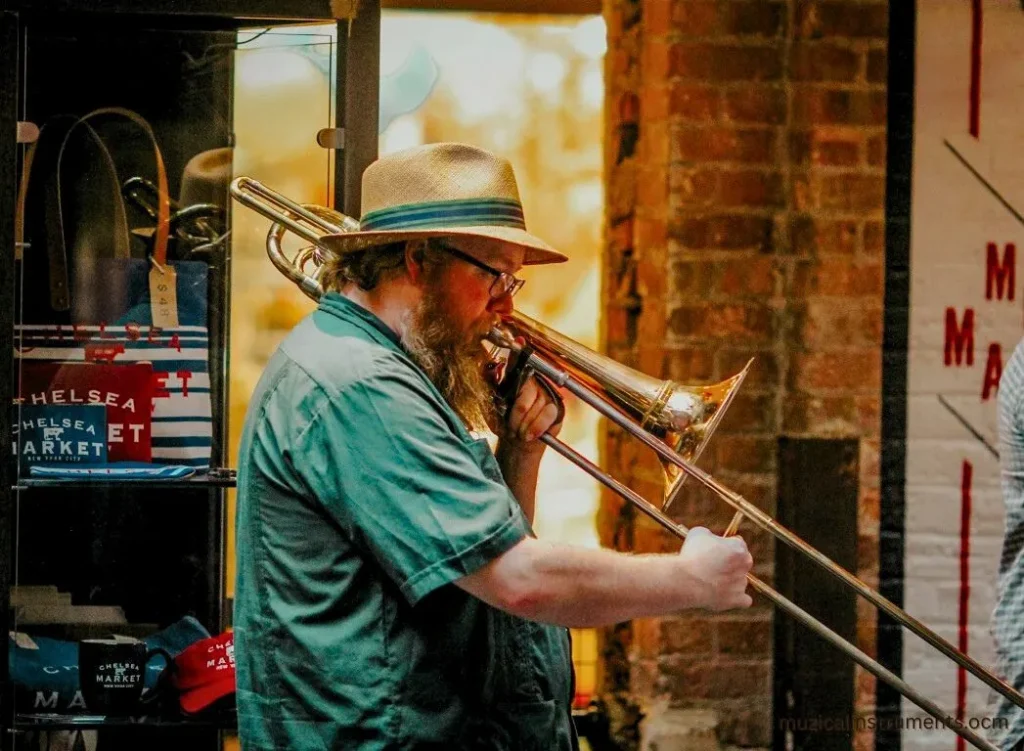
Because of this, the trombone can do a glissando. That’s a smooth sound that slides up or down. It’s fun to play. And it’s fun to hear. You might know it from cartoons, jazz music, or marching bands.
No other brass instrument works like this. That’s why people say the trombone has its own voice. It doesn’t just play notes. It talks, sings, growls, and scoops. It’s loud when it needs to be. And soft when it wants to be.
The trombone doesn’t follow the rules. It makes its own.
It Sounds Like a Human Voice
Here is another reason why the trombone is a special instrument is how it sounds. It doesn’t just play music, it talks back. The slide lets it bend notes like a singer. It can laugh, cry, growl, and even whisper.
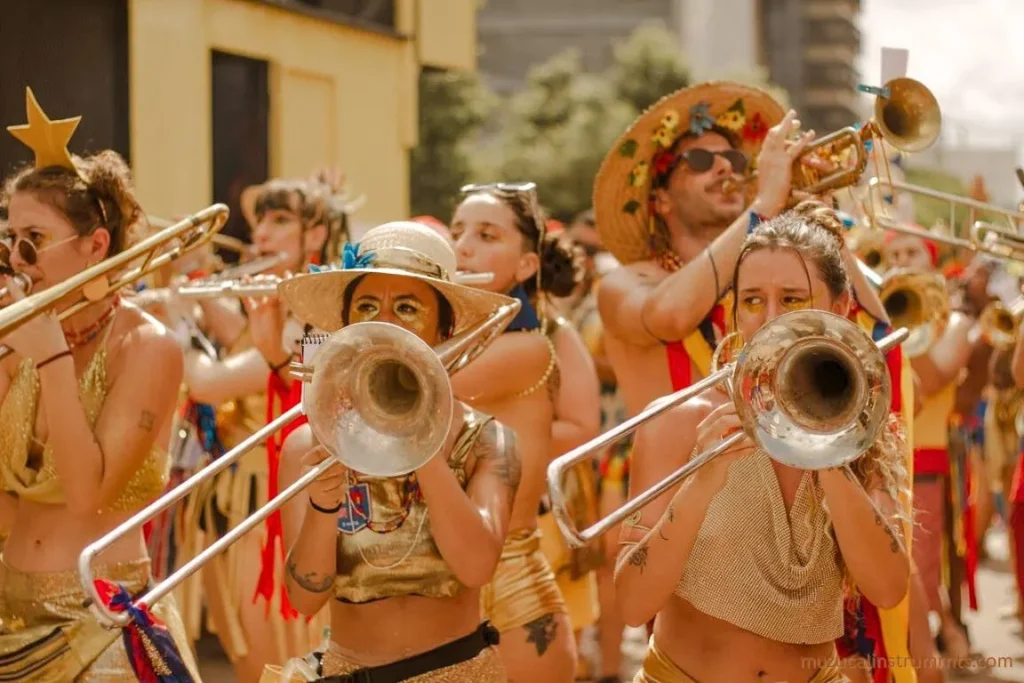
In jazz, players use this to show feelings. They make the trombone shout or moan, just like a person. One famous player, Trombone Shorty, makes his trombone sing like his own voice. A long time ago, Glenn Miller used the same tricks in big band music.
The trombone isn’t just a brass tube. It’s a voice with a slide. That’s what makes it fun. That’s what makes it different. That’s also why the trombone is a special instrument to so many musicians.
It Plays Many Roles in Music
Here’s another reason why the trombone is a special instrument, it fits in almost every kind of music. You’ll see it in marching bands, jazz clubs, big fancy orchestras, and even in old cartoons that make you laugh.
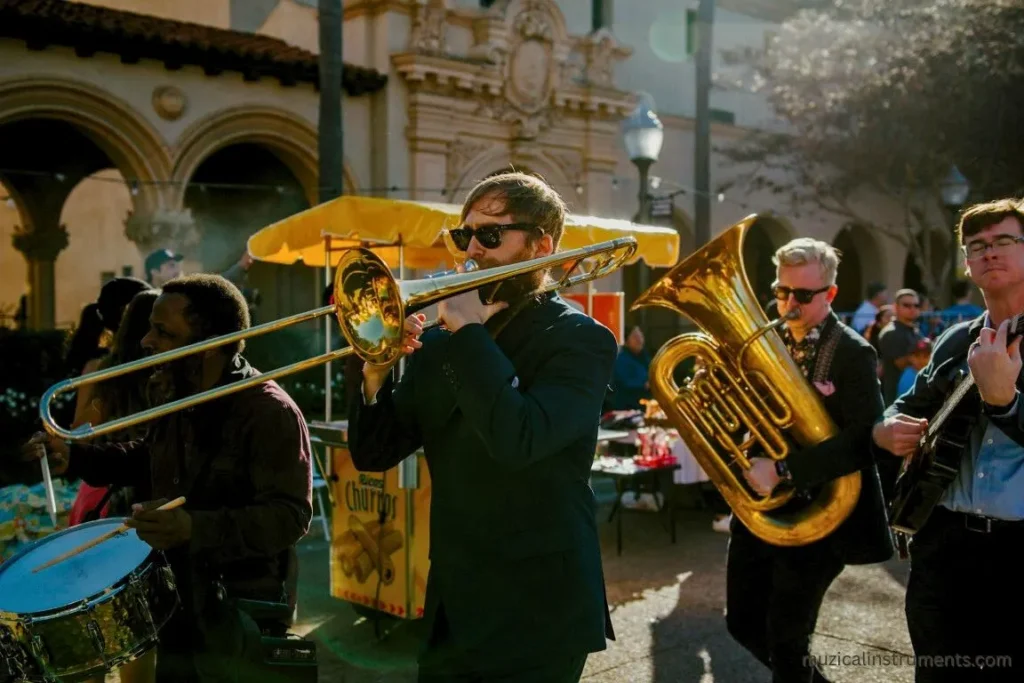
It wasn’t always called a trombone. Long ago, it had a funny name “sackbut.” People used it in churches and castles. Later, the famous composer Beethoven started using it in his music, and that helped the trombone become more popular in concert halls.
But it never got stuck in just one place. That’s the cool part. Whether it’s sliding around in a jazz solo or blasting through a parade, the trombone always knows how to steal the spotlight.
Famous Faces Behind the Slide
If you’re still wondering why the trombone is a special instrument, just look at who plays it.
There’s Trombone Shorty. He started playing when he was four years old. Now he fills stadiums with music that’s loud, wild, and full of heart. He makes the trombone sound like it’s dancing.
Before him, there was Glenn Miller. He led a big band a long time ago. His trombone didn’t shout, it sang smooth, sweet tunes people still love today.
And way before that, there was Beethoven. Yeah, the serious classical guy. He added trombones to his symphonies when no one else did. That was a big deal.
Don’t forget Jack Teagarden. He played jazz with style. Some say he made the trombone sound like it had its own voice.
So, cool? Serious? Loud? Smooth? Yep, all of it.
That’s the kind of company the trombone keeps.
Famous Trombone Players Who Made It Cool
| Name | Style | Why They’re Famous |
|---|---|---|
| Trombone Shorty | Funk/Jazz | High energy, started playing at age 4 |
| Glenn Miller | Big Band | Smooth melodies, WWII band leader |
| Jack Teagarden | Jazz | Known for warm tone and vocal style |
| Beethoven | Classical | First to use trombone in symphony |
A Trombone for Every Player
You might think there’s just one trombone but nope. There are a few kinds. And they all sound a little different.

The one most people learn first is the tenor trombone. It’s the “regular” one. Big bell, long slide, classic sound.
Then there’s the bass trombone. It’s heavier, lower, and rumbles like a giant’s voice. It plays the deep stuff in bands and orchestras.
Some people use a small one called a soprano trombone. It’s kind of rare and sounds more like a trumpet, but it still slides.
And get this there are even plastic trombones, like the pBone. They’re light, bright–colored, and great for kids. Same shape. Same slide. Way less heavy.
So if you want big and bold, or small and smooth, or just something fun and purple you’ve got choices.
That’s another reason why the trombone is a special instrument. It bends the rules… and sometimes comes in blue.
Different Types of Trombones and What Makes Them Unique
| Type | Pitch | Weight | Common Use | Notes |
|---|---|---|---|---|
| Tenor Trombone | Mid-range | Medium | School bands, jazz, orchestra | Most common starter trombone |
| Bass Trombone | Low/deep | Heavier | Orchestra, concert bands | Plays the lowest parts |
| Soprano Trombone | High | Light | Specialty or solo playing | Rare, sounds like a trumpet |
| pBone (Plastic) | Mid-range | Very Light | Beginners, kids | Colorful and fun to hold |
Why It’s Fun to Learn
So… should you try learning the trombone?
Totally.
It’s actually one of the easiest brass instruments to start on. No tricky valves. Just a slide and your breath. Even if you’ve got braces, it’s still doable. Lots of kids play with no problem.
Learning trombone also helps your body. You sit or stand tall. You use your lungs to take big, steady breaths. It builds your focus, your posture, even your core muscles. And your lips? They get strong too. That’s called your embouchure, basically the way your mouth makes the sound.
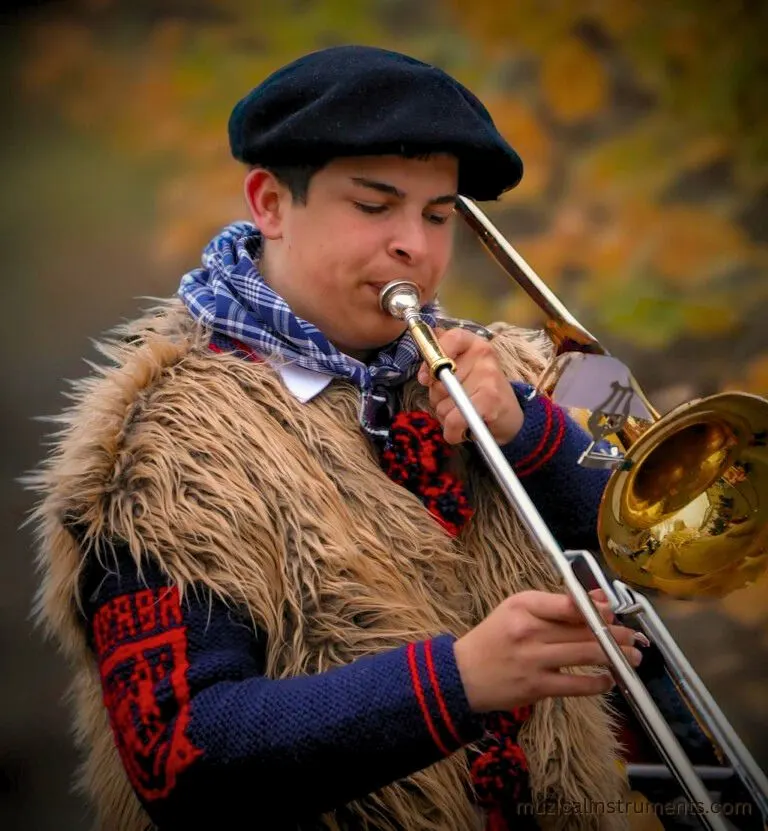
It’s not just playing notes. You’re moving, thinking, breathing, and listening all at once. It’s like training your brain and body together. And when you hit a note just right? That loud, bold sound? Feels awesome. Confidence goes up fast.
So yeah, it takes practice. But it’s fun from day one. And if you stick with it, you’ll sound like a boss in no time.
How Learning the Trombone Helps Your Body and Brain
| Benefit | How It Helps You |
|---|---|
| Breathing | Builds strong lungs and deep focus |
| Posture | Teaches you to sit/stand up straight |
| Embouchure Control | Strengthens lips and mouth muscles |
| Muscle Memory | Slide positions train hand coordination |
| Confidence | Loud sound builds boldness and pride |
| Beginner Friendly | Easy to start — even with braces! |
Final Thoughts
So, Why Is the Trombone a Special Instrument?
By now, you’ve probably got the picture.
The trombone isn’t just special, it’s one of a kind.
It slides instead of clicks. It laughs, growls, sings, and shouts. It fits into jazz, orchestras, cartoons, parades, you name it. Legends like Trombone Shorty and Beethoven made it cool in totally different ways. And whether you’re tall, small, loud, quiet, new, or experienced… there’s a trombone out there for you.
It’s not too hard to learn. It helps your body and mind. And when you let that big bold sound fly? It feels amazing.
So if you’re thinking about picking one up go for it.
There’s nothing else like it.
That’s why the trombone is a special instrument.
In jazz, the trombone adds depth, but if you want to know how the saxophone became the voice of jazz, this article breaks it down beautifully
FAQ: Why is the trombone a special instrument? Let’s Clear Things Up
1. Is the trombone harder to learn than other instruments?
Not really! It’s actually one of the more forgiving brass instruments. No buttons or valves, just a slide. That can feel strange at first, but once your ear gets used to the notes, it’s fun and kind of addicting. Plus, it’s beginner-friendly even if you have braces.
2. Why does the trombone even matter in an orchestra?
Great question. When that big, bold sound comes in, it adds depth and drama. No other brass instrument can slide into a note like a trombone. In soft moments, it blends in. In loud ones, it cuts through. That range is why composers like Beethoven and Mahler loved it.
3. What makes the trombone sound so unique?
That slide! It lets players glide between notes like a voice, something most instruments can’t do. The trombone can wail, laugh, growl, or sing. In jazz, it sounds playful. In classical, it’s powerful. In ska or funk, it’s just plain fun.
4. Is it too big or loud for younger players?
Nope. There are plastic trombones (like the pBone) that are light and easy to handle. And as for volume? You control that. It’s not always loud, it’s about learning how to use your breath. Even kids can play it gently and still sound great.
5. Can the trombone really be cool?
Totally. From Trombone Shorty to movie soundtracks to jazz solos that make your hair stand up there’s nothing else like it. It’s bold, expressive, and super fun to play. Once you hear a good solo, you’ll get it.
6. How does the trombone slide work?
Think of it like a musical tape measure. You push and pull the slide to change the notes instead of pressing buttons. It takes a little practice, but once you get it, it feels smooth, almost like singing.
7. Do you have to have long arms to play it?
Nope! Lots of younger players do just fine. There are tricks like using a slide extension or simply leaning forward a bit for those far-out notes. Teachers help with that. And your arms grow into it faster than you’d think.
8. What’s the difference between a trombone and a trumpet?
The biggest difference is the slide vs. valves. Trumpets use buttons to change pitch. Trombones use a slide, which gives you that gliding sound. Trombones also have a lower, fuller voice, like a baritone singer compared to a tenor.

